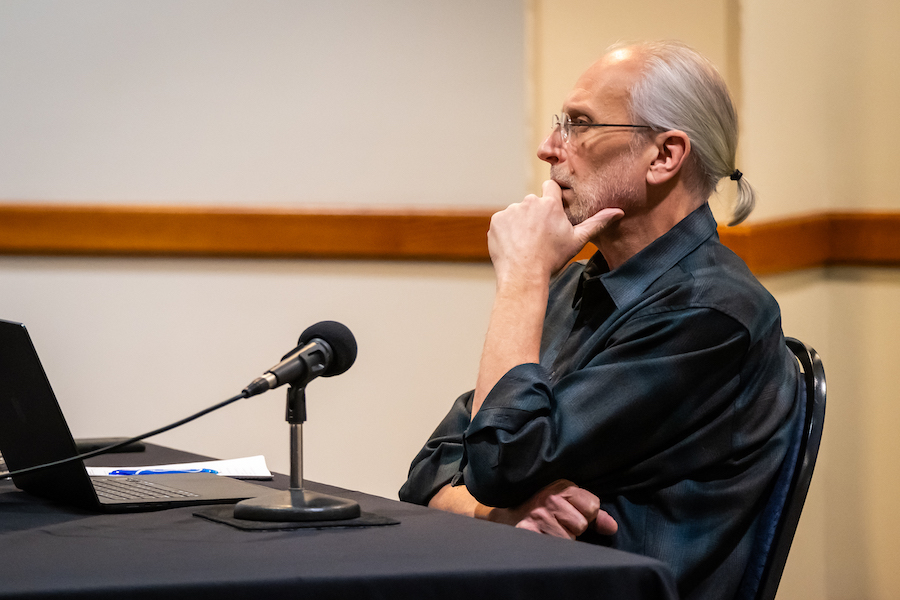East Lansing Council Declines Pay Raise (For Now); Clash Over Transparency in Board Appointments
Note: This story and title was corrected to make it clear the pay increase could take place at a future meeting.
The East Lansing City Council declined to pass a motion that would install a pay increase recommended by the Elected Officers Compensation Commission at the Oct. 7 council meeting.
The Elected Officers Compensation Commission meets every two years during the odd-year election cycle to revisit and decide the pay of council members and the mayor. Council can vote to accept or deny the commission’s recommendations, it cannot modify them. Rejecting the Elected Officers Compensation Commission recommendation requires votes from four out of five council members, and the matter will return at a future council meeting. This means the pay increase could still eventually happen.
Data was collected on other comparable cities to East Lansing in terms of the population, and one with a Big Ten school. The commission reviewed the data and unanimously voted to raise the annual mayor’s pay from $11,000 to $15,000, and council members’ pay from $9,470 to $13,000.
The pay increase was recommended largely to make the council more income inclusive and promote stability within city government, according to a memo written by Elected Officers Compensation Commission Chair Marie Wicks.
Councilmember Dana Watson provided data from the 2023 gender and ethnic wage gap study conducted by the Boston Women’s Workforce Council. The data compares earnings per dollar for women by race and ethnicity to a single dollar that white men make.

“Please consider the work that has to be done on this East Lansing City Council,” Watson said. “Let us know if you’re thinking about just yourself or if you’re thinking about community, and the extra lift that it takes to pull this off for the diverse voices that are needed at this table.”
Councilmember Erik Altmann motioned to reject the recommendation, City Attorney Steve Joppich recommended council prepare a formal motion to reject it, and pass that motion at its next meeting.
The motion to draft a formal motion to reject passed in a 3-2 vote, Watson and Mayor George Brookover voted against, while Altman, Councilmember Mark Meadows and Mayor Pro Tem Kerry Ebersole Singh voted in favor. There was little discussion outside of Watson’s comments.
Relationships between city board members and council members comes into focus.
Watson and Meadows requested to add a discussion about the city’s board and commission application process.
Watson said she wanted to discuss the form because it wasn’t initially clear Kathy Swedlow was married to Altmann when she applied to be on the city’s police oversight commission.
Watson questioned the timeline and why Swedlow didn’t apply to serve on the oversight commission before Altmann was elected to the City Council.
“I think there should be a spot where that’s recognized,” Watson said. “Where anyone isn’t being blindsided, bringing in someone who has a possible conflict and talk that through.”
Swedlow was unanimously approved by council to serve on the commission in February of 2024, a few months after Altmann was elected to serve on City Council. Unlike most commission appointments, which are passed on the consent agenda without discussion, Swedlow’s appointment and her relationship with Altmann were discussed publicly before her appointment was voted on. Altmann recused himself from the vote.
Altmann said the conversation was “completely ridiculous and based on a petty grievance,” and pointed out that council knew he was married to Swedlow at the time of the vote. Meadows said Swedlow disclosed she was married to a council member at the end of her interview to be on the commission. Meadows, who has served on City Council on-and-off for more than 30 years, said there have been several council members who are married to board members.
Watson shared that she read a recent article outlining that there’s no real oversight for lawmaker and lobbyist marriages. “It helped me think about how do we be transparent and appoint people in a way where if there’s a conflict, we can talk it through, or maybe we don’t consider partners.”
Brookover asked about the legality of questioning people’s relationship status with other people.

“There’s a whole myriad of relationships, especially in today’s society…I don’t know the status of the law,” Brookover said.
Brookover mentioned he would consider this, but not before the city attorney can provide advice on the spectrum of what’s legal versus not legal. He then requested that the city attorney prepare an opinion letter outlining what restraints, if any, the council has regarding inquiring about interpersonal relationships in terms of commission appointments and to list the necessary recommended changes to the existing application form.
Meadows chimed in and added, “I don’t support identifying the spouse or partner of an individual on an application. I remember the interview with Erik’s spouse and how excellent that interview was.”
Altmann said he doesn’t want to waste anyone’s time or taxpayer money to have the city attorney draft a letter.
“The idea that my wife and I are the same person is from a bygone era,” Altmann said. “It’s like the 1950s called and wants its assumptions back.”
Council voted 4-1 to have the city attorney draft an opinion letter, Altmann voted against.

